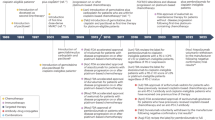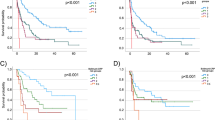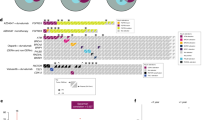Abstract
Cisplatin-based chemotherapy is currently the first-line standard of care for patients with metastatic urothelial cancer (mUC); however, up to 50% of patients are ineligible for cisplatin, necessitating alternative treatment options. Immune checkpoint inhibitors have been shown to be effective in cisplatin-ineligible patients. However, despite advances in the first-line setting, the prognosis remains poor, and challenges persist in selecting optimal therapies, treatment sequences and combination regimens. Maintenance therapy with avelumab revealed improved overall (OS) and progression-free survival (PFS) compared with best supportive care alone in patients with platinum-responsive mUC. Antibody–drug conjugates and targeted therapy with fibroblast growth factor receptor (FGFR) inhibitors have shown promise in selected patients, particularly in patients with metastatic disease that has progressed despite platinum-based chemotherapy. At the European Society of Medical Oncology Congress in 2023, groundbreaking results were presented from two phase III trials, EV-302/KEYNOTE-A39 and CheckMate 901, focusing on previously untreated mUC. In the former, the combination of enfortumab vedotin and pembrolizumab showed significant improvements in OS, PFS and overall response rate compared with chemotherapy alone; the combination of nivolumab with gemcitabine–cisplatin chemotherapy demonstrated a significant extension in median OS, PFS and overall response rate compared with chemotherapy alone. In addition, erdafitinib therapy resulted in significantly longer OS than chemotherapy among patients with mUC and FGFR alterations after previous treatment with immune checkpoint inhibitors. This comprehensive summary of the current treatment landscape for mUC incorporates clinical trial evidence and discussion of agents that are currently under investigation to provide support for clinical decision making and understanding of future therapeutic approaches.
Key points
-
Bladder cancer is the tenth most diagnosed cancer worldwide, affecting about 2.4 per 100,000 women and 9.5 per 100,000 men worldwide per year.
-
Between 5% and 10% of people with urothelial cancer have metastatic disease at diagnosis.
-
Cisplatin-based chemotherapy is currently the standard of care for first-line treatment of mUC, with a median overall survival of about 14 months.
-
Up to 50% of individuals with mUC are ineligible for cisplatin based on the Galsky criteria; carboplatin, gemcitabine and immunotherapeutic agents are alternatives.
-
Immunotherapy, antibody–drug conjugates and targeted agents, such as FGFR inhibitors, have revolutionized the mUC treatment landscape.
This is a preview of subscription content, access via your institution
Access options
Access Nature and 54 other Nature Portfolio journals
Get Nature+, our best-value online-access subscription
$29.99 / 30 days
cancel any time
Subscribe to this journal
Receive 12 print issues and online access
$209.00 per year
only $17.42 per issue
Buy this article
- Purchase on Springer Link
- Instant access to full article PDF
Prices may be subject to local taxes which are calculated during checkout



Similar content being viewed by others
References
Siegel, R. L., Miller, K. D., Fuchs, H. E. & Jemal, A. Cancer statistics, 2021. CA Cancer J. Clin. 71, 7–33 (2021).
Del Bene, G. & Sternberg, C. N. Systemic chemotherapy in muscle invasive and metastatic bladder cancer: present and future. Urologia 84, 130–141 (2017).
Mari, A. et al. Patterns and predictors of recurrence after open radical cystectomy for bladder cancer: a comprehensive review of the literature. World J. Urol. 36, 157–170 (2018).
Galsky, M. D. et al. Treatment of patients with metastatic urothelial cancer “unfit” for cisplatin-based chemotherapy. J. Clin. Oncol. 29, 2432–2438 (2011).
De Santis, M. et al. Randomized phase II/III trial assessing gemcitabine/carboplatin and methotrexate/carboplatin/vinblastine in patients with advanced urothelial cancer who are unfit for cisplatin-based chemotherapy: EORTC Study 30986. J. Clin. Oncol. 30, 191 (2012).
Suzman, D. L. et al. FDA approval summary: atezolizumab or pembrolizumab for the treatment of patients with advanced urothelial carcinoma ineligible for cisplatin-containing chemotherapy. Oncologist 24, 563–569 (2019).
Fradet, Y. et al. Randomized phase III KEYNOTE-045 trial of pembrolizumab versus paclitaxel, docetaxel, or vinflunine in recurrent advanced urothelial cancer: results of >2 years of follow-up. Ann. Oncol. 30, 970–976 (2019).
D’Angelo, A. et al. An update on antibody–drug conjugates in urothelial carcinoma: state of the art strategies and what comes next. Cancer Chemother. Pharmacol. 90, 191–205 (2022).
Marandino, L. et al. Erdafitinib for the treatment of urothelial cancer. Expert Rev. Anticancer Ther. 19, 835–846 (2019).
Maiorano, B. A., Catalano, M., Maiello, E., Roviello, G. Enfortumab vedotin in metastatic urothelial carcinoma: the solution EVentually? Front. Oncol. 13, 1254906 (2023).
Von der Maase, H. et al. Gemcitabine and cisplatin versus methotrexate, vinblastine, doxorubicin, and cisplatin in advanced or metastatic bladder cancer: results of a large, randomized, multinational, multicenter, phase III study. J. Clin. Oncol. 18, 3068–3077 (2000).
Loehrer, P. J. et al. A randomized comparison of cisplatin alone or in combination with methotrexate, vinblastine, and doxorubicin in patients with metastatic urothelial carcinoma: a cooperative group study. J. Clin. Oncol. 10, 1066–1073 (1992).
Von Der Maase, H. et al. Long-term survival results of a randomized trial comparing gemcitabine plus cisplatin, with methotrexate, vinblastine, doxorubicin, plus cisplatin in patients with bladder cancer. J. Clin. Oncol. 23, 4602–4608 (2005).
Sternberg, C. N. et al. Seven year update of an EORTC phase III trial of high-dose intensity M-VAC chemotherapy and G-CSF versus classic M-VAC in advanced urothelial tract tumours. Eur. J. Cancer 42, 50–54 (2006).
Bamias, A. et al. Prospective, open-label, randomized, phase III study of two dose-dense regimens MVAC versus gemcitabine/cisplatin in patients with inoperable, metastatic or relapsed urothelial cancer: a Hellenic Cooperative Oncology Group study (HE 16/03). Ann. Oncol. 24, 1011–1017 (2013).
Galsky, M. D. et al. Atezolizumab with or without chemotherapy in metastatic urothelial cancer (IMvigor130): a multicentre, randomised, placebo-controlled phase 3 trial. Lancet 395, 1547–1557 (2020).
Powles, T. et al. Pembrolizumab alone or combined with chemotherapy versus chemotherapy as first-line therapy for advanced urothelial carcinoma (KEYNOTE-361): a randomised, open-label, phase 3 trial. Lancet Oncol. 22, 931–945 (2021).
Bamias, A. et al. Atezolizumab monotherapy versus chemotherapy in untreated locally advanced or metastatic urothelial carcinoma (IMvigor130): final overall survival analysis from a randomised, controlled, phase 3 study. Lancet Oncol. 25, 46–61 (2024).
Powles, T. et al. Durvalumab alone and durvalumab plus tremelimumab versus chemotherapy in previously untreated patients with unresectable, locally advanced or metastatic urothelial carcinoma (DANUBE): a randomised, open-label, multicentre, phase 3 trial. Lancet Oncol. 21, 1574–1588 (2020).
van Heijden, M. S. et al. Nivolumab plus gemcitabine–cisplatin in advanced urothelial carcinoma. N. Engl. J. Med. 389, 1778–1789 (2023).
Powles, T. B. et al. LBA6 EV-302/KEYNOTE-A39: open-label, randomized phase III study of enfortumab vedotin in combination with pembrolizumab (EV+P) vs chemotherapy (Chemo) in previously untreated locally advanced metastatic urothelial carcinoma (la/mUC). Ann. Oncol. 34, S1340 (2023).
O’Donnell, P. H. et al. Enfortumab vedotin (EV) alone or in combination with pembrolizumab (P) in previously untreated cisplatin-ineligible patients with locally advanced or metastatic urothelial cancer (la/mUC): subgroup analyses of confirmed objective response rate (cORR) from EV-103 cohort K. J. Clin. Oncol. 41, 499–499 (2023).
Galsky, M. D. et al. Comparative effectiveness of cisplatin-based and carboplatin-based chemotherapy for treatment of advanced urothelial carcinoma. Ann. Oncol. 23, 406–410 (2012).
Balar, A. V. et al. Atezolizumab as first-line treatment in cisplatin-ineligible patients with locally advanced and metastatic urothelial carcinoma: a single-arm, multicentre, phase 2 trial. Lancet 389, 67–76 (2017).
Balar, A. V. et al. First-line pembrolizumab in cisplatin-ineligible patients with locally advanced and unresectable or metastatic urothelial cancer (KEYNOTE-052): a multicentre, single-arm, phase 2 study. Lancet Oncol. 18, 1483–1492 (2017).
Bellmunt, J. et al. Pembrolizumab as second-line therapy for advanced urothelial carcinoma. N. Engl. J. Med. 376, 1015–1026 (2017).
Ozyilkan, O. et al. Outcomes by complete response to first-line pembrolizumab or platinum-based chemotherapy in advanced urothelial carcinoma (UC) in KEYNOTE-361. J. Clin. Oncol. 41, 4513–4513 (2023).
Bamias, A. et al. Final overall survival (OS) analysis of atezolizumab (atezo) monotherapy vs chemotherapy (chemo) in untreated locally advanced or metastatic urothelial carcinoma (mUC) from the Phase 3 IMvigor130 study. J. Clin. Oncol. 41, LBA441–LBA441 (2023).
US Food and Drug Administration. FDA limits the use of Tecentriq and Keytruda for some urothelial cancer patients. FDA www.fda.gov/drugs/resources-information-approved-drugs/fda-limits-use-tecentriq-and-keytruda-some-urothelial-cancer-patients (2023).
European Medicines Agency. EMA restricts use of Keytruda and Tecentriq in bladder cancer. EMA www.ema.europa.eu/en/news/ema-restricts-use-keytruda-tecentriq-bladder-cancer (2023).
Virgil, H. First-line nivolumab/ipilimumab fails to improve OS vs chemotherapy in PD-L1–low unresectable or metastatic urothelial carcinoma. Cancer Network www.cancernetwork.com/view/first-line-nivolumab-ipilimumab-fails-to-improve-os-in-vs-chemotherapy-in-pd-l1-low-unresectable-or-metastatic-urothelial-carcinoma (2023).
Iacovelli, R. et al. First line avelumab in PD-L1+ve metastatic or locally advanced urothelial cancer (aUC) patients unfit for cisplatin (cis): The ARIES trial. J. Clin. Oncol. 40, 439–439 (2022).
Hoimes, C. J. et al. Enfortumab vedotin plus pembrolizumab in previously untreated advanced urothelial cancer. J. Clin. Oncol. 41, 22–31 (2023).
US Food and Drug Administration. FDA grants accelerated approval to enfortumab vedotin-ejfv with pembrolizumab for locally advanced or metastatic urothelial carcinoma. FDA www.fda.gov/drugs/resources-information-approved-drugs/fda-grants-accelerated-approval-enfortumab-vedotin-ejfv-pembrolizumab-locally-advanced-or-metastatic (2023).
Siefker-Radtke, A. O. et al. Erdafitinib (ERDA) vs ERDA plus cetrelimab (ERDA+CET) for patients (pts) with metastatic urothelial carcinoma (mUC) and fibroblast growth factor receptor alterations (FGFRa): final results from the phase 2 Norse study. J. Clin. Oncol. 41, 4504–4504 (2023).
Loriot, Y. et al. First-line pembrolizumab (pembro) with or without lenvatinib (lenva) in patients with advanced urothelial carcinoma (LEAP-011): a phase 3, randomized, double-blind study. J. Clin. Oncol. 40, 432–432 (2022).
Grivas, P. et al. Immune checkpoint inhibitors as switch or continuation maintenance therapy in solid tumors: rationale and current state. Target Oncol. 14, 505–525 (2019).
Szabados, B. et al. Response rate to chemotherapy after immune checkpoint inhibition in metastatic urothelial cancer. Eur. Urol. 73, 149–152 (2018).
Sonpavde, G. P. et al. Impact of the number of cycles of platinum based first line chemotherapy for advanced urothelial carcinoma. J. Urol. 200, 1207–1214 (2018).
Powles, T. et al. Avelumab maintenance therapy for advanced or metastatic urothelial carcinoma. N. Engl. J. Med. 383, 1218–1230 (2020).
Powles, T. et al. ASCO GU 2023: avelumab first-line maintenance for advanced urothelial carcinoma: long-term follow-up from the JAVELIN Bladder 100 Trial in subgroups defined by 1L chemotherapy regimen and analysis of OS from start of 1L chemotherapy. UroToday www.urotoday.com/conference-highlights/asco-gu-2023/asco-gu-2023-bladder-cancer/142535-asco-gu-2023-avelumab-first-line-1l-maintenance-for-advanced-urothelial-carcinoma-long-term-follow-up-from-the-javelin-bladder-100-trial-in-subgroups-defined-by-1l-chemotherapy-regimen-and-analysis-of-overall-survival-from-start-of-1l-chemotherapy.html (2023).
Barthelemy, P. et al. Full analysis from AVENANCE: a real-world study of avelumab first-line (1L) maintenance treatment in patients (pts) with advanced urothelial carcinoma (aUC). J. Clin. Oncol. 41, 471–471 (2023).
Antonuzzo, L. et al. READY: real-world data from an Italian compassionate use program of avelumab first-line maintenance (1LM) treatment for locally advanced or metastatic urothelial carcinoma (la/mUC). J. Clin. Oncol. 41, 469–469 (2023).
Bellmunt, J. et al. Pembrolizumab (pembro) versus investigator’s choice of paclitaxel, docetaxel, or vinflunine in recurrent, advanced urothelial cancer (UC): 5-year follow-up from the phase 3 KEYNOTE-045 trial. J. Clin. Oncol. 39, 4532–4532 (2021).
Balar, A. V. et al. Atezolizumab as first-line therapy in cisplatin-ineligible patients with locally advanced and metastatic urothelial carcinoma: a single-arm, multicentre, phase 2 trial. Lancet 389, 67 (2017).
Powles, T. et al. Atezolizumab versus chemotherapy in patients with platinum-treated locally advanced or metastatic urothelial carcinoma (IMvigor211): a multicentre, open-label, phase 3 randomised controlled trial. Lancet 391, 748–757 (2018).
Ning, Y. et al. FDA approval summary: atezolizumab for the treatment of patients with progressive advanced urothelial carcinoma after platinum‐containing chemotherapy. Oncologist 22, 743 (2017).
Gust, K. M. et al. Second line immune checkpoint inhibition in urothelial cancer. Transl. Androl. Urol. 8, 414 (2019).
Ciccarese, C. et al. Second-line therapy for metastatic urothelial carcinoma: defining the best treatment option among immunotherapy, chemotherapy, and antiangiogenic targeted therapies. A systematic review and meta-analysis. Semin. Oncol. 46, 65–72 (2019).
Knowles, M. A. & Hurst, C. D. Molecular biology of bladder cancer: new insights into pathogenesis and clinical diversity. Nat. Rev. Cancer 15, 25–41 (2015).
Liu, Q. et al. FGFR families: biological functions and therapeutic interventions in tumors. MedComm. https://doi.org/10.1002/MCO2.367 (2023).
Loriot, Y. et al. Erdafitinib in locally advanced or metastatic urothelial carcinoma. N. Engl. J. Med. 381, 338–348 (2019).
US Food and Drug Administration. FDA grants accelerated approval to erdafitinib for metastatic urothelial carcinoma. FDA https://www.fda.gov/drugs/resources-information-approved-drugs/fda-grants-accelerated-approval-erdafitinib-metastatic-urothelial-carcinoma (2019).
Loriot Y et al. THOR: survival benefit seen with erdafitinib in advanced urothelial carcinoma. ASCO https://dailynews.ascopubs.org/do/thor-survival-benefit-seen-erdafitinib-advanced-urothelial-carcinoma (2023).
Siefker-Radtke, A. O. et al. Erdafitinib versus pembrolizumab in pretreated patients with advanced or metastatic urothelial cancer with select FGFR alterations: cohort 2 of the randomized phase III THOR trial. Ann. Oncol. https://doi.org/10.1016/j.annonc.2023.10.003 (2023).
Ascione, C. M. et al. Role of FGFR3 in bladder cancer: treatment landscape and future challenges. Cancer Treat. Rev. 115, 102530 (2023).
Sternberg, C. N. et al. FORT-1: phase II/III study of rogaratinib versus chemotherapy in patients with locally advanced or metastatic urothelial carcinoma selected based on FGFR1 / 3 mRNA expression. J. Clin. Oncol. 41, 629–639 (2023).
Li, S. et al. EV-203: phase 2 trial of enfortumab vedotin in patients with previously treated advanced urothelial carcinoma in China. J. Clin. Oncol. 41, e16574 (2023).
Rosenberg, J. et al. EV-101: a phase I study of single-agent enfortumab vedotin in patients with nectin-4-positive solid tumors, including metastatic urothelial carcinoma. J. Clin. Oncol. 38, 1041–1049 (2020).
Powles, T. et al. Enfortumab vedotin in previously treated advanced urothelial carcinoma. N. Engl. J. Med. 384, 1125–1135 (2021).
US Food and Drug Administration. FDA grants regular approval to enfortumab vedotin-ejfv for locally advanced or metastatic urothelial cancer. FDA www.fda.gov/drugs/resources-information-approved-drugs/fda-grants-regular-approval-enfortumab-vedotin-ejfv-locally-advanced-or-metastatic-urothelial-cancer (2023).
Yu, E. Y. et al. Enfortumab vedotin after PD-1 or PD-L1 inhibitors in cisplatin-ineligible patients with advanced urothelial carcinoma (EV-201): a multicentre, single-arm, phase 2 trial. Lancet Oncol. 22, 872–882 (2021).
Tagawa, S. T. et al. TROPHY-U-01: a phase II open-label study of sacituzumab govitecan in patients with metastatic urothelial carcinoma progressing after platinum-based chemotherapy and checkpoint inhibitors. J. Clin. Oncol. 39, 2474–2485 (2021).
US Food and Drug Administration. FDA grants accelerated approval to sacituzumab govitecan for advanced urothelial cancer. FDA www.fda.gov/drugs/resources-information-approved-drugs/fda-grants-accelerated-approval-sacituzumab-govitecan-advanced-urothelial-cancer (2023).
McGregor, B. A. et al. The Double Antibody Drug Conjugate (DAD) phase I trial: sacituzumab govitecan plus enfortumab vedotin for metastatic urothelial carcinoma. Ann. Oncol. https://doi.org/10.1016/J.ANNONC.2023.09.3114 (2023).
Perera, J., Hoskin, P. The role of radiotherapy in metastatic bladder cancer. J. Cancer Metastasis Treat. https://doi.org/10.20517/2394-4722.2021.167 (2022).
Abufaraj, M. et al. The role of surgery in metastatic bladder cancer: a systematic review. Eur. Urol. 73, 543 (2018).
Brown, P. D. et al. Postoperative stereotactic radiosurgery compared with whole brain radiotherapy for resected metastatic brain disease (NCCTG N107C/CEC·3): a multicentre, randomised, controlled, phase 3 trial. Lancet Oncol. 18, 1049–1060 (2017).
Tsao, M., Xu, W. & Sahgal, A. A meta-analysis evaluating stereotactic radiosurgery, whole-brain radiotherapy, or both for patients presenting with a limited number of brain metastases. Cancer 118, 2486–2493 (2012).
Fokas, E., Henzel, M. & Engenhart-Cabillic, R. A comparison of radiotherapy with radiotherapy plus surgery for brain metastases from urinary bladder cancer: analysis of 62 patients. Strahlenther. Onkol. 186, 565–571 (2010).
Seisen, T. et al. Efficacy of high-intensity local treatment for metastatic urothelial carcinoma of the bladder: a propensity score-weighted analysis from the national cancer data base. J. Clin. Oncol. 34, 3529–3536 (2016).
Chajon, E., Castelli, J., Marsiglia, H. & De Crevoisier, R. The synergistic effect of radiotherapy and immunotherapy: a promising but not simple partnership. Crit. Rev. Oncol. Hematol. 111, 124–132 (2017).
Roviello, G. et al. Focus on biochemical and clinical predictors of response to immune checkpoint inhibitors in metastatic urothelial carcinoma: where do we stand? Int. J. Mol. Sci. https://doi.org/10.3390/IJMS21217935 (2020).
Parent, P. et al. Predictive biomarkers for immune checkpoint inhibitor response in urothelial cancer. Ther. Adv. Med. Oncol. https://doi.org/10.1177/17588359231192402 (2023).
Catalano, M. et al. Immunotherapy-related biomarkers: confirmations and uncertainties. Crit. Rev. Oncol. Hematol. 192, 104135 (2023).
Helal, C. et al. Clinical utility of plasma ctDNA sequencing in metastatic urothelial carcinoma. Eur. J. Cancer 41, 4576–4576 (2023).
Loriot, Y. et al. Erdafitinib or chemotherapy in advanced or metastatic urothelial carcinoma. N. Engl. J. Med. 389, 1961–1971 (2023).
Peyrottes, A. et al. Neoadjuvant immunotherapy for muscle-invasive bladder cancer. Medicina https://doi.org/10.3390/MEDICINA57080769 (2021).
Grivas, P. et al. Avelumab first-line maintenance therapy for locally advanced/metastatic urothelial carcinoma: results from the real-world US PATRIOT-II study. J. Clin. Oncol. 42, 697–697 (2024).
Bajorin, D. F. et al. Adjuvant nivolumab versus placebo in muscle-invasive urothelial carcinoma. N. Engl. J. Med. 384, 2102–2114 (2021).
Author information
Authors and Affiliations
Contributions
M.S. researched data for the article. M.C. wrote the article. G.R. and G.P.S. reviewed and/or edited the manuscript before submission.
Corresponding author
Ethics declarations
Competing interests
The authors declare no competing interests.
Peer review
Peer review information
Nature Reviews Urology thanks Michiel van der Heijden, Benjamin Pradere, Chantal Stockem and the other, anonymous, reviewer(s) for their contribution to the peer review of this work.
Additional information
Publisher’s note Springer Nature remains neutral with regard to jurisdictional claims in published maps and institutional affiliations.
Rights and permissions
Springer Nature or its licensor (e.g. a society or other partner) holds exclusive rights to this article under a publishing agreement with the author(s) or other rightsholder(s); author self-archiving of the accepted manuscript version of this article is solely governed by the terms of such publishing agreement and applicable law.
About this article
Cite this article
Roviello, G., Santoni, M., Sonpavde, G.P. et al. The evolving treatment landscape of metastatic urothelial cancer. Nat Rev Urol (2024). https://doi.org/10.1038/s41585-024-00872-0
Accepted:
Published:
DOI: https://doi.org/10.1038/s41585-024-00872-0



